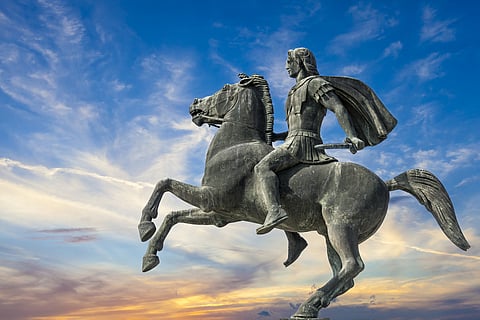
- Destinations
- Experiences
- Stay
- What's new
- Editor’s Picks
- Responsible Tourism
- CampaignsCampaigns
- Subscribe

After a long period of renovations, the palace where Alexander the Great was anointed King of Macedonia around 2,400 years ago, has reopened to the public. Aigai is located in the port city of Thessaloniki in northern Greece. “After many years of painstaking work, we can reveal the palace,“ said Greek Prime Minister Kyriakos Mitsotakis during a ceremony this weekend. “What we are doing today is an event of global importance.” According to reports, the renovation took 16 years and cost more than 20 million euros.
The Palace of Aigai, located 65 kilometres southwest of the port city of Thessaloniki in northern Greece, is from the 4th century BC and was one of the most important structures in classical Greece, comparable to the Parthenon in Athens. According to the Greek Cultural Ministry, the Palace of Aigai, also known as the Royal Metropolis of the Macedonians, was the largest edifice in classical Greece, encompassing an area of around 15,000 square metres.
Built during the reign of Philip II, Alexander the Great's father, the royal palace has a colonnade encircling it, and the agora where ancient Macedonians debated issues of the day, are all part of the site. The palace area also encompassed a theatre, banquet halls, ornate mosaics, and more than 300 tombs, including the royal tomb of Philip II, and other Macedonian monarchs, among other things.
Following his father's assassination in 336 BC, Alexander the Great was crowned in the palace courtyard. After the crowning, he launched a military campaign that established an empire that spanned into modern-day India.
Aigai is also significant as a UNESCO World Heritage site. “Aigai provides important information about the culture, history and society of the ancient Macedonians, the Greek border tribe that preserved age-old traditions and carried Greek culture to the outer limits of the ancient world,” UNESCO said, calling it “among the most important archaeological sites in Europe.”
As the capital of the Macedonian kingdom, Aigai was considered among the most significant military powers of the period. After being destroyed by the Romans in 168 BC, the city fell into ruin. It is said to have been unearthed in 1977 by Greek archaeologist Manolis Andronikos.
